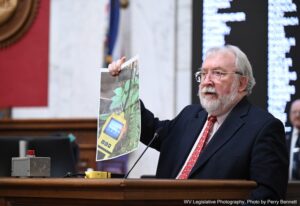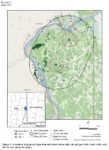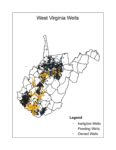|
|||||||||||
|
Below is a summary of WV SORO’s actions on bills during the 2024 West Virginia Legislature’s regular session, which ended March 9. During the session we also learned that there are land agents going door to door trying to get surface owners to sign away rights to the pore space in the rock formations under their land, and we need to educate surface owners about that. So this is intended to kill two birds with one stone. We will start with the alert since it is shorter. Feel free to share this to friends or organizations that have an interest. WV SORO does its advocacy in part through its members, and it pays for its work in part with donations. If you are not a member, please join us. And if you want to help our work, please contribute! ALERT re: Leasing Pore Space Rights If you are a surface land owner, maybe even if you also own some of the minerals under your land, you may be approached by land agents wanting to pay you to sign papers for the use of the pore space in the rock formations under your land. They want to lease the pore space for what is generally referred to as “carbon capture and sequestration” or just CCS. Power plants and other industries that generate lots of carbon dioxide want to capture that carbon dioxide (CO2) — a major contributor to climate change — before it is released into the atmosphere. Once captured, they would pipe the CO2 to a special gas well and pump it underground to store permanently — hopefully. If you are approached (or are just curious) here is our webpage about pore space leasing that you should read. Generally we recommend not signing those papers now unless you are convinced that CCS will never really happen, and even then consider what might a potential buyer worry about if the land’s pore space rights have been signed away, should you ever want to sell your surface in the future. Summary of WV SORO’s Actions During the 2024 Regular Session of the West Virginia Legislature Almost all the bills WV SORO advocated for or against are listed below. If you want to read a bill, see a bill’s history through the Legislature, and the actions taken on it (or not) go to the Bill Status page on the Legislature’s website and enter the bill number in the box. Often our goals lined up with the environmental community, which has organized itself as the West Virginia Environmental Council. In addition the trial lawyers, who now call themselves, the West Virginia Association for Justice, were often helpful. On one bill, an organization of major land holding companies was a strong ally. Finally, on just about every bill, the West Virginia Farm Bureau was a partner in our advocacy. BAD BILLS WE KILLED HB 5076 would have undercut current and future surface owner lawsuits. With help from WV SORO, the McEvoy vs. Diversified and EQT lawsuit was filed by a class of surface owners who had Diversified owned wells on their land that had not produced in the 12 months or more. (Under state law, these wells are considered “abandoned” even though they still had a “responsible operator,” Diversified.) One of the grounds for the suit was that Diversified was negligent for not following the statutory requirement to plug wells that had not produced in 12 months and that the company had not shown that the wells had a bona fide future use. In response, Diversified got this bill introduced to try to stop future lawsuits and potentially affect the current one. It would have made it illegal for violation of the statute to be used in a lawsuit. It also said that if the DEP had a consent order with Diversified to delay plugging the well, the surface owner could not sue to have the well plugged. This was an attempt to have a ruling by a judge changed. Delegate Anderson, the Chair of the House Energy Committee, moved it out of his committee. Fortunately, Delegate Fast, the Chair of the House Judiciary Committee, was persuaded principally by WV SORO not to put the bill on its agenda, and the bill died. In the lawsuit against Diversified, surface owners who had non-producing wells on them accuse the company of trespass. The mineral owner (and its lessee driller) have the right to reasonable use of the surface to produce oil and gas, but a well that is not producing, that is a potential source of pollution, and that is affecting the surface owner’s property values, is no longer a reasonable use — or a use at all. So a non-producing well is trespassing. Additionally, the lawsuit sued EQT for voidable/fraudulent transfer of wells that were still producing small amounts when EQT transferred them to Diversified. The lawsuit seeks to have EQT come up with the cost to plug those wells as they stop producing and become “abandoned.” The lawsuit says that EQT transferred a bunch of low producing wells to Diversified when it knew or should have known that Diversified was not going to have the money to plug those wells. Diversified actually paid EQT for the wells when we think EQT should have paid Diversified to take the wells off its hands and plug them. (Similarly, if a driller offers to sell a well to a surface owner, say one getting house gas off a well, the surface owner should not pay for the well. The driller should pay the surface owner at least $5,000 (the cost of the bond the surface owners will have to put up) to take ownership of the well.)
The bill would have done that, and much more. The US Environmental Protection Agency is giving out grants for “community air monitoring.” If the bill passed, the West Virginia’s Department of Environmental Protection would not have been allowed to use those community monitoring tests for regulatory programs or other purposes, and would only have the limited number of air monitoring sites in the State that they now have. The general environmental community was also very much opposed to the bill for that latter reason and led the fight against it. Again, Chairman Anderson of the House Energy Committee got the bill out of his committee and it passed the House of Delegates. Senate President Blair pushed for it to be placed on the Senate Energy Committee agenda. However, it was ultimately killed by Senator Randy Smith, the Chair of the Senate Energy Committee, in the last few days of the session. We sent out an alert urging you to contact your legislators. Looks like it helped! Thank YOU! SB 822 would have put a stop to “carbon offset agreements” on managed timberland. Some companies and other persons and entities who produce a lot of carbon dioxide want to be, or get close to being, carbon neutral. To the extent they cannot completely eliminate their carbon emissions, they buy carbon “credits” to count against their emission numbers. They pay other people and entities to do things that take carbon out of the air or otherwise reduce climate change. One of the big credits that these carbon emitters can purchase is a “forest carbon offset.” Through a “carbon offset agreement” they pay landowners to manage their timberland so that it reduces carbon in the atmosphere. As a practical matter, this bill would have eliminated payments to West Virginia landowners for forest or timber carbon credits. It would have put an extra tax on them. It would have eliminated them from lower property tax “managed timberland” status, and so on. WV SORO found this offensive. When the big out-of-state corporations were paying West Virginia landowners $1 an acre for their minerals, the Legislature did nothing to protect West Virginia citizens from abuses. Oil and gas minerals have been separate from surface rights for more than 100 years. But it wasn’t until the 1980’s that the Legislature made the drillers compensate the surface owner — and then it was only the value of the lost hayfield, not the value to the driller of using the surface owner’s land for producing thousands of dollars of oil or gas. And for those of us who own some of the minerals under our surface, the Legislature did nothing to protect us from abusive oil and gas lease terms when the out-of-state drillers presented us their “standard” leases – like the “general warranty” provision that would make us pay for the driller’s lawyer if the driller got the title opinion wrong. In fact, the Legislature even passed a law that let the drillers record only a memorandum of the lease in the courthouse so mineral owners could not find out how much money and what other good terms the drillers were giving their neighbors. And now, when out-of-state companies and others finally want to put money into West Virginia by buying forest carbon credits for proper management of our timber — now the Legislature considers legislation that would interfere with, and in the case of this bill, even eliminate that! This bill was sponsored by Senator Tarr and passed out of the Senate Finance Committee, which he chairs. But ultimately, with lots of help from folks in the environmental community, we were able to get the Senate to kill the bill by burying it in the Rules Committee. Probably even more importantly, the major land holding companies fought with us against this one. SB 618 would have created a state owned monopoly on timber carbon credit exchanges. The sale and purchase of forest carbon credits discussed in the explanation of SB 822 are often arranged by private exchanges, comparable to real estate brokers or comparable to national commodity exchanges — like for corn. This bill would have created a state owned monopoly on all West Virginia timber carbon credit sales and purchases by having them go through the West Virginia Division of Forestry. And it would have given the Division of Forestry the right to set some prices! While this bill’s provisions were not as obviously draconian as SB 822, it would have pretty much the same effect. Persons or entities wanting to purchase timber carbon credits would have bought them from landowners in neighboring and other states and not from West Virginia landowners. The bill was sponsored by Senator Woodrum, passed out of the Government Organization committee, which he chairs, then passed out of the Senate Finance Committee, and ultimately passed the whole Senate. Thankfully, it died in the House Finance Committee chaired by Delegate Criss. As with the other bills we killed, WV SORO partnered with the general environmental community, the Farm Bureau, major landowners, and other interested parties to stop SB 618. BAD BILLS WE FIXED SB 164 nearly eliminated double damages for trespassing on real property. The bill sponsor intended it to deal with damages done by homeless people who broke into abandoned buildings and did damage to the buildings and who were actually convicted of a crime. However, the introduced bill (that flew out of the Senate in the first three days without even going through one committee first) also eliminated a provision in West Virginia’s existing trespass laws that gives a landowner double damages in a civil lawsuit when a trespasser damages property while trespassing. Very often surface owners use that statute when oil and gas companies tear down fences, etc. We pointed out the change in civil double damages to Delegate Fast, the Chair of the House judiciary committee. The House fixed the problem and the Senate agreed to the fix. HB 5013 another dubious attack on managed timberland/forest carbon credits. This bill ended up being a third act attack on forest carbon credits. “Managed timberland” is a designation of property for real estate property tax purposes that gives a tax break if the timber is properly managed. The West Virginia Division of Forestry has to approve the tax break. Until the bill passed, if the timberland was part of a “subdivision” it could not be included in the tax break, or could not be included if the land was part of a farmland preservation program. However, it was obvious that Delegate Anderson slipped in two words that might have taken timberland subject to a “carbon offset” agreement out of the tax break designation if the agreement “precluded” commercial timbering. The problem could be that a particular forest or timber carbon offset agreement, although not strictly “precluding” timbering, could restrict it so that so few trees could be timbered that a logging company would not find it profitable (and therefore not “commercial”) to move in all of their equipment necessary to timber those few trees. The bill flew out of Chair Anderson’s Energy Committee, had passed the House and was in a Senate Committee before we were convinced not to try to kill the bill. It was never our intention to interfere with the two good provisions regarding subdivisions and farmland preservation. Representatives from the Division of Forestry said that the timber carbon credit agreements they had seen on timberland that had applied for managed timberland tax breaks were acceptable. See the Division of Forestry’s webpage if you are interested. We will have to watch and make sure the Division stays true to its current position. WV SORO will soon have a webpage that outlines how landowners in West Virginia can get the managed timberland tax break and get paid for timber carbon credits. GOOD BILLS THAT DIED HB 4292 would have required drillers to pay attorneys’ fees when they are sued by mineral owners for non-payment of royalties from conventional wells. For horizontal shale wells, if the driller does not pay royalties, the mineral owners can sue and get some statutory interest. And the amounts of royalties from these wells are large enough that a lawyer would take such a case asking only a percentage of the recovery as a fee. For “conventional” vertical wells it’s a different story. Almost none of them are being drilled. The production from the existing wells is fading with time. Sometimes the royalties are only a few hundred dollars over one or a couple months. Still it is income that many folks rely upon. The problem is that the driller knows that the amount of money at stake is so low that an attorney would not take the case for a percentage of the recovery, and hiring an attorney by the hour would probably cost more than is owed. HB 4292 was sponsored by Delegate Anderson, who ran it out of his committee, through the House, and over to the Senate. Industry lobbyists succeeded in weakening the bill considerably in the Senate Energy Committee and then it went to the Senate Finance Committee. The Senate Finance Committee kind of fixed one problem, but took out another good provision that had already been compromised. Worst of all, the Senate Finance Committee added in a provision that the new statute could be used for coal royalties. The oil and gas industry was already unhappy with the bill and including coal was a poison pill and the bill died. We’ll be back next year smarter. SB 532 & HB 5414, the Orphaned Well Prevention Act — it never moved! West Virginia has more than 15,000 wells that have not produced in the last 12 months and that should have already been plugged if the drillers followed the law. Of those, about 6,500 have gone unplugged for so long that the driller has gone out of business and they are now “orphaned”. WV SORO has gotten legislation passed in previous sessions that plugged a few of these orphaned wells. There are also three huge payouts of federal money for plugging wells from the Bipartisan Infrastructure Law enacted in the Infrastructure Investment and Jobs Act, but that is still far from enough. And it does no good to pour water into a bucket with a hole in it! So we have drafted these two bills and gotten them introduced to prevent future orphaned wells. Why have the drillers ignored the law to plug wells? And how has West Virginia gotten so many orphaned wells? Mostly because the current oil and gas driller bonding statutes are dismal failures. We have not found anywhere in the country where bonding for well plugging has worked. That is because the bonding companies will not issue the bonds that would be needed for the full cost of plugging the wells because they know the lengths that the drillers will go to in order to avoid paying to plug wells. Therefore we have high praise for Senator Randy Smith and Delegate Evan Hansen for sponsoring the Oil and Gas Well Prevention Act in their respective houses. Delegate Anderson never put the bill on the agenda of the House Energy Committee. Senator Smith tried to get the industry to agree to something, but could not. The industry is very powerful these days and it seems like the Legislature needs a permission slip from every driller before anything improving the lot of surface owners or the environment can pass. The WV Environmental Council made this bill their highest priority this year, and their two lobbyists worked very hard to get the bill passed, but to no avail. It is hoped that with the promise of federal money to plug orphaned wells if the Legislature does more next year, and with the groundwork that was laid this year, and more grassroots support, something can be done next year. To learn more about this bill see this one page fact sheet or go to the text of the bill itself and start by reading the “note” at the end of the bill. HB 5048 – providing funding for more oil and gas inspectors, also didn’t move. The DEP Office of Oil and Gas (OOG) said funding provided by the 2023 Legislature would fund just 23 inspectors for 75,000 wells for which the DEP has records (3,000+ wells for each inspector) – plus the WVGES has records of as many as 15,000 to 23,000 more wells, usually those drilled before 1929. Those same inspectors are also responsible for 20,000 associated tanks, reviewing 200 or 300 new permit applications each year that need their down-hole casing program and well pad construction reviewed and approved, inspecting the 8 to 14+ horizontal well rigs working 24 hours a day 7 days a week that should have multiple inspections during crucial stages of drilling such as cementing of ground water and coal casing, and for responding to citizen complaints. A report by national organizations called the Groundwater Protection Council and the Interstate Oil and Gas Compact Commission says that nationally inspectors inspect an average of 590 wells a year – so West Virginia needs 127. The OOG has so few inspectors that in order to be able to spend the first payout of federal money to plug orphaned wells, the six companies in six regions in West Virginia were allowed to choose and pay their own inspectors called “compliance officers.” We are not making this up! Plugging wells is THE most tempting operation for shortcuts in the exploration and production process, and after the plugging of a well is done, those shortcuts are buried and usually cannot be proven. WV SORO has always known there are too few inspectors (another reason there are 6,500 orphaned wells in West Virginia), but we have never had scientific proof — until a study by Princeton and McGill Universities tested 79 active conventional wells in 13 counties. The study found that those wells were leaking an average of 9 cubic feet of gas — per hour. Leaks are just plain wasteful. Leaks rip off royalty owners, and reduce state tax collections. Leaks often stink, and leaking methane helps warm the planet. A 2012 report by the Legislative Auditor’s Performance Evaluation & Research Division details the dangers from unplugged wells and how they harm property values. HB 5048 provided funding for more inspectors by requiring drillers to pay more fees per more wells, the way all other industries in the State fund their State oversight. WVSORO would also agree to using a portion of the severance tax for this purpose. But despite all of this proof of the need for more inspectors, nothing happened. We will try again next year. HB 5624 – the West Virginia Land Reunion Act Junior, died. Each year we have introduced a version of the West Virginia Land Reunion Act that would let surface owners step into the shoes of people, who at a tax sale, bought some of the minerals under the surface owner. We were working with current State Auditor John McCuskey who was enthusiastic to try to come up with a workable bill, but we just could not get it done this year. HB 5624 did something small that might have helped surface owners at least find out who owns the minerals under their land. That way the surface owner could have offered to buy the minerals. As an alternative to our bill, the surface owners could watch the paper each year to see if the mineral owners had failed to pay taxes so the surface owner could bid at the tax sale. HB 5624 would have required the surface owner to get a notice when a lease of the minerals was signed or maybe when a unit declaration was later filed. This bill was a whole new idea and, as such, ran into snags. But we hope to be back next year with a new version, as well as a full blown West Virginia Land Reunion Act. If you want to hear our recording of a song encouraging a West Virginia land reunion, we have it on our website. There’s Always Next Year! WV SORO plans to be back at the Legislature during the 2025 legislative session. In the meantime, we plan to keep watch on what else happens with the industry and the state and federal government. In particular, we hope that EPA can be persuaded that the third payout of federal orphaned well plugging money will go to states that, instead of requiring bonding, require drillers to start putting plugging money away now. WV SORO does its advocacy through and with the support of its members. It pays for its work with donations. If you are not a member, please join us. And if you want to help our work, please contribute! |
|||||||||||
WV Surface Owners' Rights Organization © 2016
Frontier Theme


 HB 5018 would have prevented surface owners from using in court the results of tests using hand-held methane testers in their backyard.
HB 5018 would have prevented surface owners from using in court the results of tests using hand-held methane testers in their backyard.





